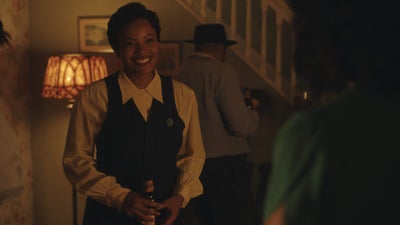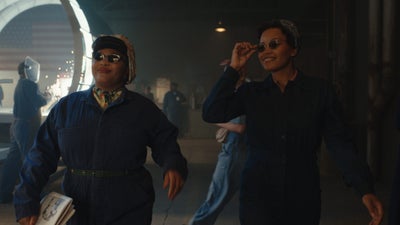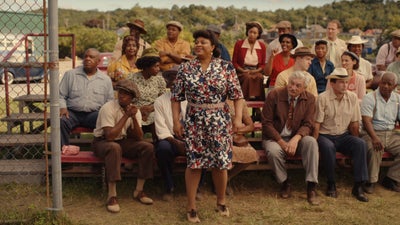‘A League Of Their Own’ Stars Chante Adams And Gbemisola Ikumelo Talk Sisterhood, White Saviors & Finding Your Own Team

If you were a girl growing up in the nineties, there’s a good chance that you’ve seen the film A League of Their Own based on the All-American Girls Professional Baseball League established during World War II. And if you were a Black girl, you remember one particular scene from the movie. A Black woman who never speaks throws a ball with force into the mitt of the lead character Geena Davis. And that’s the last we see or hear from her.
Thankfully, in the new Prime series A League of Their Own, we get to, in the words of one of its stars, Chanté Adams, “follow her home.” ESSENCE spoke to Adams and Gbemisola Ikumelo, who play Maxine Chapman and Clance Morgan in the new show about the Black women they represent on screen, the absence of white saviors and finding your own team.
Can you speak about the importance of Black sisterhood on the show? I was so happy when Clance told Maxine, ‘I love you more than anybody else in the world,’ while her husband was standing there.
Adams: I think that’s just important representation to have period. We’re kind of like in a Black sisterhood renaissance in tv and film. We’re getting a lot of Black female friendship stories. The relationship between Max and Clance really is no different. Max and Clance are soulmates. The unconditional love they have for each other is so pure. They didn’t need to be born as sisters because they found each other and still became that close. It’s so beautiful to play and it’s even more wonderful to do it with such a talented actress like Gbemi. It’s a very natural chemistry that we have. I don’t know, maybe me and Gbemi are soul mates too.
Ikumelo: I think so. I do. I thought it the moment I saw you. I didn’t want to say it then but now that you bring it up…It’s really important to see more of us just getting to do life. Do the friendships that we do, with our own sisterhoods and it being nothing bigger than what it is. We’re Black women and we get to have fun with other Black people. So many of the things I grew up watching about sisterhood and friendship was through the lens of whiteness. And you find your way in. Black people have learned to go, ‘I’m a Monica or I’m a Phoebe.’ But when there are Black women as well, it’s so inspiring because you realize we actually have been starved of that.
Adams: What’s so beautiful is how different Max and Clance are. I think we often see these friendships and we get why they’re friends. They share the same hobbies. But Max and Clance connect because they’re outsiders. Because they’re weird. They’re two very different and complex individuals but love each other despite their differences. I think that that is what real friendship is.
From the onset it seems like Clance is very protective of Max. Why do you both think that’s the case?
Ikumelo: I think they both know what world they live in. You make a wrong move, it’s life or death. We’re finding a lot of the joy in this show but there are high stakes. In the second episode, they have to venture out to find some stuff and they have to go into a white neighborhood to find it. That stuff is dangerous. I think protection is real because it’s like, ‘You’re my sister and I need you to be here.’ In the pilot, I think she says, ‘You need not to be murdered.’
Adams: That protectiveness from Clance specifically comes from the fact that Max is pretty sheltered. She comes from a two-parent household. She has experienced that love all her life, whether it’s through her parents or through her community. We see Clance come in as a person who is just now building her own family. The two most important people in her life are her husband and her best friend. And she can’t afford to lose that. We are her family. The stakes are a little higher for Clance. These are my people I can’t lose them because I don’t have that many.
When they do period pieces that involve Black people, they create a ‘white savior’ character. I was so happy to see that they didn’t just let Max on the team to make everyone feel good. Can you speak about the absence of a ‘white savior’ in this series?
Adams: Our show is telling a story of a generation of women in baseball and we are pulling from different things that actually happened. And we would not be telling an authentic story if we allowed Max to get on the team. Those women who Max’s character is based on, Toni Stone, Mamie Johnson, Connie Morgan, they didn’t have no white savior so Max couldn’t either. We need to tell the story in the most authentic way so people can understand what it was really like. A friendship forms between Max and Abbi Jacobson’s character Carson but we’re staying far away from that white savior mentality. White people wasn’t saving us.
Ikumelo: I think a lot of those white savior story lines come from the fact that the rooms and the voices telling those stories are from a white lens. And when they’re involving Black people in these stories, it’s through a lens of guilt. But the people in this room, telling this story are Black people, are queer people, are from different backgrounds. So there’s no room for that in our story because we’re telling it. These are our voices. So there’s authenticity there.
Had either of you heard of the Black women who Maxine’s character is based upon?
Adams: No! Which is why it’s so important for us to say their names now and for us to talk about them as much as we can. I say their names in every interview and I don’t feel bad about it because for so many years, no one said their names. So now, we’re at this point and we have this platform to shed light on these three iconic women who played in the Negro Leagues. If you are a baseball fan, you should know who they are. If you are a fan of Black women, you should know who they are. I didn’t know who they were but I feel very honored to take my little flashlight and be like, ‘There they are.’
Ikumelo: I didn’t either. The minute we started getting into the story–and I got to be in the writer’s room as well–there was a lot of research. I didn’t know much about baseball, really before I came to this. But now, I feel like there are echoes of them everywhere. There was a play about Toni [Stone] on Broadway. It felt quite serendipitous. I’m now hearing about these women more and more.
Chanté, I read you were allowed in the writer’s room. What feedback did you have in terms of shaping your character?
Adams: It was more so to allow me to know what they were working on. But even if I wasn’t in the writer’s room, I was calling or texting Gbemi like, ‘Whatchall doing over that?’ It wasn’t really feedback but me being able to tell my own personal story and the story of my family members as well.
I have a Black, queer uncle that I’ve never met and don’t know anything about but because I shared that story with Abbi and Will [Graham, the show’s co-creator] about his life and how he was estranged from the family, they ended up naming my father’s character after him. It was small things like that that allowed me to bring my personal life into the story. But because the writer’s room was so diverse and there were Black women all up in through that thang, I trust it.
To promote the series, they’re using the hashtag #FindYourOwnTeam, can you speak a little bit about what that means to you?
Ikumelo: For me, finding your team–it’s going to get deep now. It’s almost biblical. We’re not put on earth to be alone. Humans are social beings. I think the root of a lot of our pain can sometimes be found in the absence of family, sisterhood, and your team. So finding your team boils down to the essence of what makes us, us. When you start to do that, you get to flourish as an individual as well. And I think that’s what this story is about.
Source: Read Full Article


